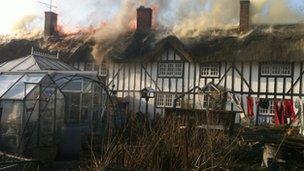Dangers of leaving your home uninsured
- Published

Home owners who do not have buildings insurance could lose out if disaster strikes
If your home was destroyed by a fire that was not your fault and you did not have buildings insurance, could you recoup the cost of rebuilding it?
The latest figures available suggest more than 1.5 million homeowners may not have cover if the worst was to happen to their home.
Until last year Violet, a pensioner, lived in a semi-detached, thatched cottage which she inherited from her parents. Then in March, a fire believed to have started in her neighbour's chimney spread to her house, burning both of them down.
Speaking to Radio 4'sMoney Boxshe said: "It quickly spread to my side. The wind was blowing my way, we had about 10 fire engines here but I lost just about everything."
Violet's neighbour has buildings insurance and his insurer has agreed to meet his claim. Violet had cover until a few years ago but then cancelled it because of the cost, something she now bitterly regrets: "Being on a low income, I had to let the contents and house insurance go, but in retrospect I wish I had been insured because now I can't claim on anything."
Since the fire Violet has lived in a mobile home in her garden which local people clubbed together to buy her.
Vulnerable properties
It is unclear exactly how many other homeowners like Violet would not be covered if something similar happened to them.
But figures published by the Financial Services Authority in 2006 estimated that more than 10% of people do not have buildings insurance and UK government figures for 2010 put the number of owner occupiers at more than 17 million. This suggests the number of uninsured could be more than 1.5 million.
There is no evidence that the cause of the fire was as a result of negligence nor anything other than an accident.
Malcolm Tarling, from the Association of British Insurers, says the only way someone in Violet's position might be able to claim is if they were able to prove their neighbour had been negligent: "The law says if you want to claim against someone else you have to show they were negligent, and their negligence resulted in your property being damaged."
However, that may not be an easy thing to prove. Laura Checkley, a property litigation solicitor at Pemberton Greenish, says an accident which was not easy to predict would not fall into this category: "A person has to take reasonable care to make sure they don't cause reasonably foreseeable harm to another person's property. So you would have to show that their behaviour fell short of that reasonable standard."
Money Box, externalis broadcast on Saturdays at 12:00 GMT onBBC Radio 4, externaland repeated on Sundays at 21:00 GMT. You can listen again via theBBC iPlayer, externalor by downloading Money Boxpodcast, external.
- Published27 February 2012